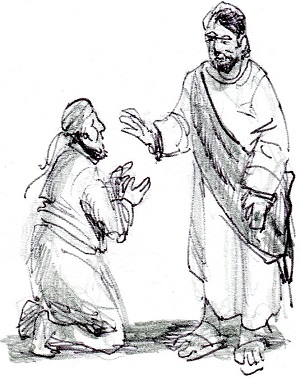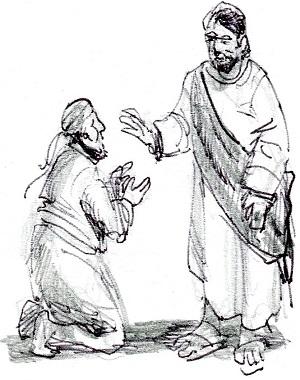

“Lord, if you wish, you can make me clean” (Luke 5:13).
1 John 3:5-13; Luke 5:12-16
Today’s Gospel could be titled “A Day in the Life of Jesus.” His ministry is in full swing and he is traveling from town to town preaching that the Reign of God has come. Something new and wonderful is in the air, and his reputation is preceding him, stirring up hope and excitement. A man “full of leprosy” is waiting for him when he arrives in a certain town. Luke’s description suggests a full-blown disease and a victim desperate for help. As the crowd stands back, the man falls prostrate and pleading on the ground before Jesus.
We are then given a glimpse into the deeper suffering he is enduring, for his plea for help includes the possibility that Jesus might decide not to heal him: “Lord, if you wish, you can make me clean.” Disease was seen by some as punishment for sin. Priests, not doctors, were the arbiters of whether he should be readmitted to the community. Jesus immediately responds by first stretching out his hand to touch the man, then says, “I do will it. Be made clean.”
By touching the leper, Jesus breaks a Levitical rule and social taboo, contaminating himself and incurring another ritual to restore his own purity before entering the town. By reaching out, he has stretched the limits of religious control imposed by leaders who decided who was clean and who was outcast. But, behold, the leper is suddenly cleansed. God is at work here, and all the rules and rituals are irrelevant as divine power flows from Jesus’ touch and voice.
Jesus tells the former leper to show himself to the priests and perform the ritual prescribed by Moses, but also orders the man not to broadcast this spectacular healing. He knows this miracle will lead to a confrontation with the local synagogue officials and, soon after, with the temple establishment in Jerusalem. He is operating outside the system, and the crowds are quick to see that God’s mercy is being given freely without rituals or special offerings.
It is brisk business once word gets out, and great crowds flock to Jesus to be healed. He ends the day by escaping into the wilderness to pray, likely absorbing the implications of his preaching and healing ministry. At stake was the image of God as overflowing with unconditional love for everyone in contrast to the religious system that mediated God’s mercy as a quid pro quo for purity and obedience to the Law. The lines are drawn between divine mercy and human legalism. Jesus is threatening the whole structure of religion representing God for its own benefit.
Unconditional love is a scandal; forgiveness is a sign of weakness; nonviolence is an invitation to abuse; self-sacrifice and service are for losers. Yet, this is the God Jesus revealed and modeled for his followers. Only grace and a lifetime of experience can reveal how effective this discipleship can be if what we want is not just to be good but to change the world.
Advertisement







